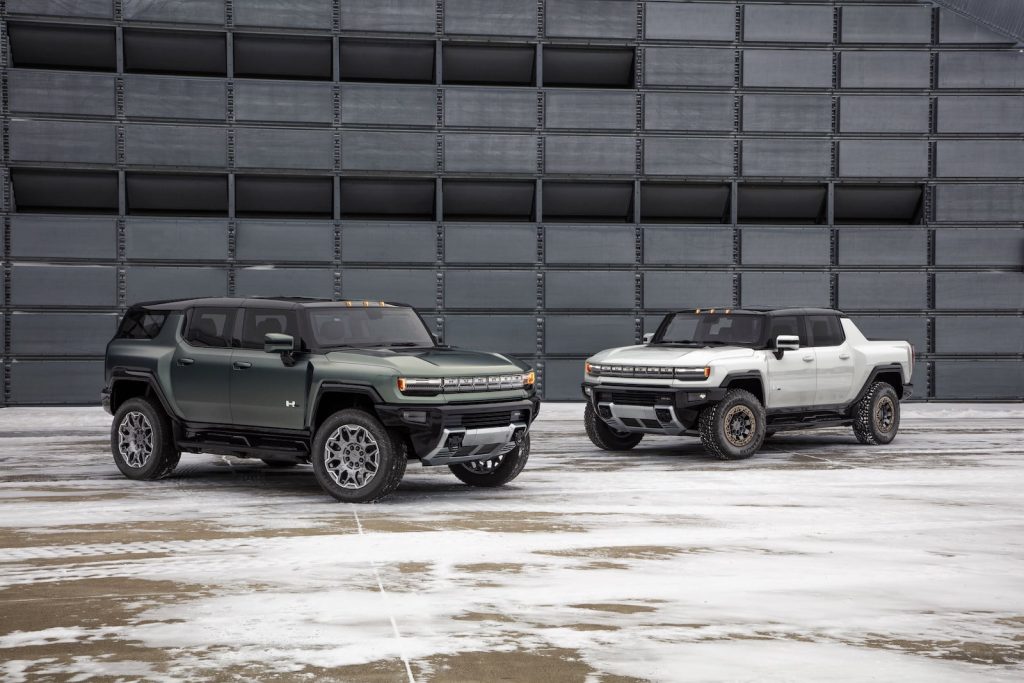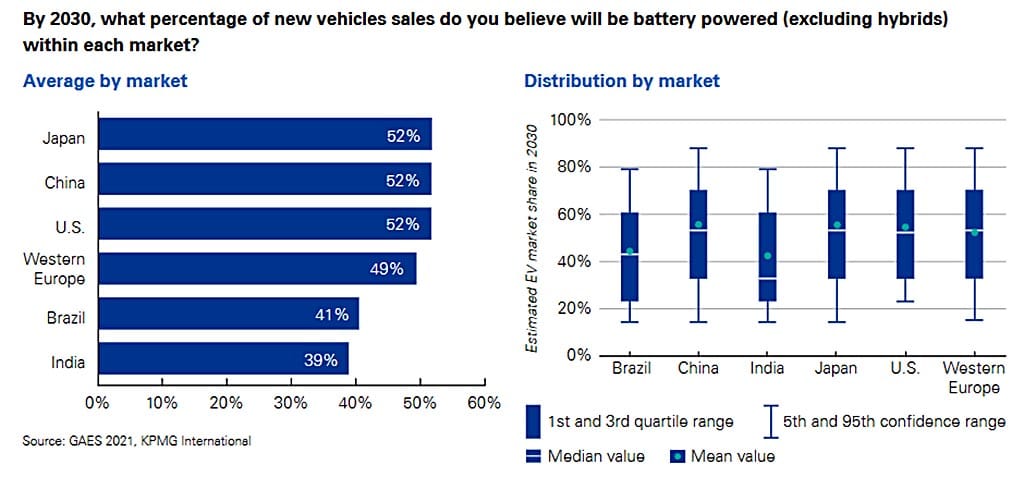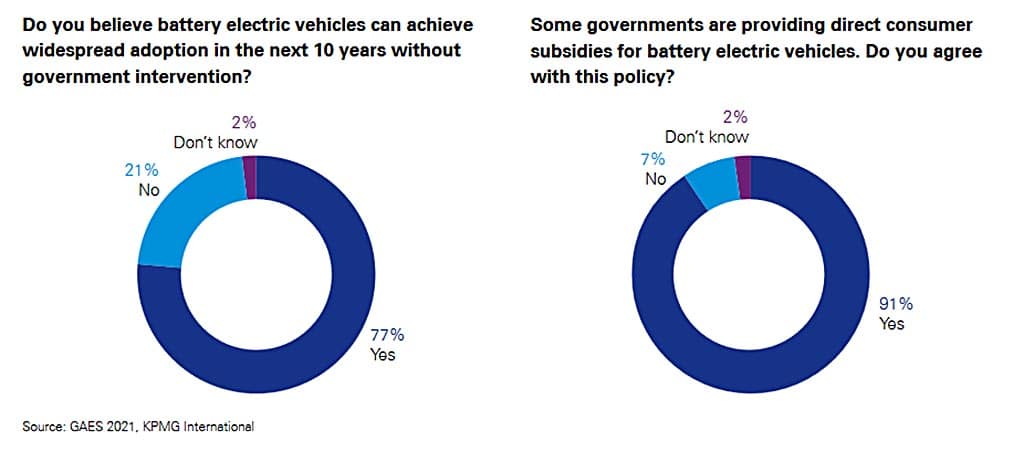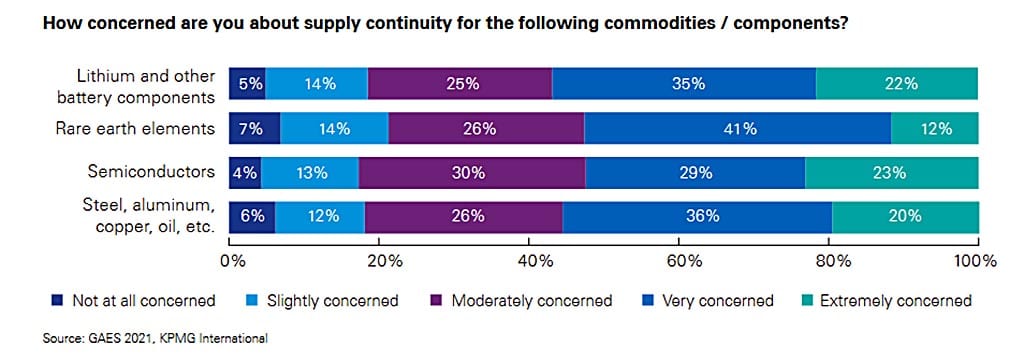When President Joe Biden set a goal of having EVs reach 40 to 50% of the U.S. market by 2030 there were plenty of skeptics — but don’t count auto industry execs among them.

If anything, electric vehicles will make up just more than half of both the U.S. and Chinese markets by decade’s end, according to a new survey of automotive leaders by consulting firm KPMG.
“Among the big trends is a shift to electric vehicles, which is likely to gather pace as a bevy of new and exciting EVs hit the market. By the end of the decade,” said Gary Silberg, KPMG’s Global head of Automotive. Another factor driving the shift, he added, is “EV costs are expected to approach parity with internal combustion-powered vehicles.”
Sales already on the rise
As recently as 2019, EVs were little more than an asterisk on the U.S. sales charts. But demand began to surge during the first year of the COVID pandemic and, during the first half of 2021, sales of pure battery-electric vehicles alone more than doubled. The pace continues to accelerate heading into 2022.
It helps to have so many new models offering motorists greater options in more market segments. These run the gamut from the relatively short-range Mazda MX-30 SUV to the 520-mile Lucid Air Dream Edition. Two all-electric pickups, the Rivian R1T and GMC Hummer SUT, are taking the technology to commercial and lifestyle buyers. And even more offerings will hit showrooms by the end of 2022 when, TheDetroitBureau.com recently reported, there will be more than 50 BEVs available — about four times more than today.
China is seeing an even more rapid expansion as a broad mix of existing brands, along with a flood of new startups, come to market with new BEVs, as well as plug-in hybrids.

U.S., China set to take the lead
The 1,100 automotive executives in 31 countries who responded to the KPMG survey forecast that electric vehicles will account for 52% of new vehicle sales in the U.S., China and Japan by 2030. Somewhat surprisingly, they predicted demand will be lower, not only in emerging markets like Brazil and India, but also in Europe.
Several other studies have put Europe in the lead for EV adoption, in part due to strict new regulations that are nudging manufacturers to phase out internal combustion engines. Rising fuel prices are also playing a role. Significantly, EVs already account for anywhere from 50% to 70% of demand in Norway. And Great Britain saw its share top 15% in September — UK motorists buying nearly as many EVs that month as they did in all 2019.
There are plenty of obstacles to address in the process of bringing EVs into the mainstream, and the KPMG survey underscores that uncertainty. Those who responded forecast the technology could make up anywhere from 20% to 80% of the Chinese market by 2030.
The carrot and the stick

Many governments are taking a carrot and stick approach to promoting EVs. Along with new emissions and fuel efficiency regulations, they’re providing both industry and consumer incentives. The U.S. Congress currently is considering a measure that would increase tax credits for EV buyers from $7,500 today to as much as $12,500.
While 91% of the industry leaders were supportive of sales incentives, the KPMG study also found 77% of the executives confident EVs will reach mass adoption without such givebacks.
Not everyone is as certain. Stellantis CEO Carlos Tavares told Reuters he worries EVs will be limited primarily to the wealthy because they cost substantially more to produce than vehicles with internal combustion engines.
“There is no way we can transfer 50% of additional costs to the final consumer because most parts of the middle class will not be able to pay,” said Tavares.
Driving down costs will be critical
But other senior leaders see light at the end of that tunnel. During an online briefing this week, Nissan CEO Makoto Uchida said the automaker hopes to bring the price of batteries down to as little as $65 per kilowatt-hour as production ramps up. Most manufacturers are paying between $100 and $150 per kWh today. The difference would add up to as much as $8,500 in a long-range model with a 100 kilowatt-hour pack. Nissan aims to cut the cost of other EV components, as well, with its future models reaching “parity” with gas-powered vehicles before the end of the decade.

And Nissan isn’t alone. General Motors CEO Mary Barra recently forecast that GM revenues will double as it switches to EVs, while margins will push into double-digits. And the KPMG survey found 53% of the respondents “extremely” or “somewhat confident” the industry will achieve profitable growth during the next five years. Nine percent were neutral, with 38% raising various levels of concern. Execs in the U.S. were the most optimistic, those in France the most pessimistic.
The leadership survey found industry leaders expect to see other changes sweep through the auto industry by 2030, including “a lot of M&A” activity, according to Silberg. Seventy-five percent of those who responded anticipate their companies will sell off non-core operations.
In light of the ongoing semiconductor shortages, the study did sound a note of alarm about the switch to EVs: the challenge of preventing future supply chain disruptions. Fully 95% of those responding to KPMG said they had some level of concern about “supply continuity” for lithium and other battery components, while 96% are worried about semiconductor supplies going forward. Even when it comes to more conventional materials like steel, aluminum and copper, only 6% of the executives said they were not concerned.
"industry" - Google News
December 01, 2021 at 10:04PM
https://ift.tt/3xRMQLa
EVs Will Dominate US, Chinese Markets by 2030, Industry Execs Forecast - Paul Eisenstein
"industry" - Google News
https://ift.tt/2RrQtUH
https://ift.tt/2zJ3SAW
Bagikan Berita Ini














0 Response to "EVs Will Dominate US, Chinese Markets by 2030, Industry Execs Forecast - Paul Eisenstein"
Post a Comment